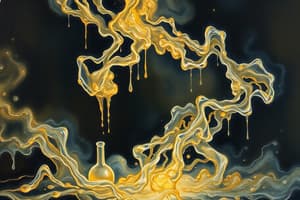Podcast
Questions and Answers
What is the core focus of chemistry as mentioned in the text?
What is the core focus of chemistry as mentioned in the text?
- Electrical conductivity
- Properties of matter (correct)
- Biological interactions
- Physical transformations
In a chemical reaction, what occurs during synthesis?
In a chemical reaction, what occurs during synthesis?
- Chemical bonds remain unchanged
- New substances are formed (correct)
- Atoms repel each other
- Molecules separate
How are chemical reactions typically represented?
How are chemical reactions typically represented?
- With balancing numbers (correct)
- Through abstract art
- Using only words
- Using music notes
What type of process is iron rusting considered as?
What type of process is iron rusting considered as?
Which category of chemical reactions involves the breaking of chemical bonds?
Which category of chemical reactions involves the breaking of chemical bonds?
What is the key characteristic of a single displacement reaction?
What is the key characteristic of a single displacement reaction?
Which type of chemical reaction involves breaking down complex compounds into simpler ones?
Which type of chemical reaction involves breaking down complex compounds into simpler ones?
What is the result of the reaction when copper sulfate interacts with silver metal?
What is the result of the reaction when copper sulfate interacts with silver metal?
Which variable influences the rate of chemical reactions by affecting the kinetic energy of reactant particles?
Which variable influences the rate of chemical reactions by affecting the kinetic energy of reactant particles?
In chemical reactions, what do catalysts primarily do?
In chemical reactions, what do catalysts primarily do?
What are single displacement reactions characterized by?
What are single displacement reactions characterized by?
Which type of chemical reaction involves combining two or more simple substances to form a compound?
Which type of chemical reaction involves combining two or more simple substances to form a compound?
Flashcards are hidden until you start studying
Study Notes
Chemical Reactions: Unlocking Transformations at the Molecular Level
Chemistry is the study of matter's properties, behaviors, and transformations. At its core lie chemical reactions—processes where molecules combine, separate, or rearrange to form new substances with different characteristics. In this exploration, we will delve into these fundamental events, discover how they work, and appreciate their ubiquity in our daily lives.
Defining Chemical Reactions
A chemical reaction occurs when one or more types of atoms combine, separate, or change places to form new substances. These changes involve the breaking of chemical bonds between atoms (decomposition) or the formation of new bonds between them (synthesis). A chemical equation summarizes these processes using symbols and balancing numbers to represent reactants and products. For instance, iron rusting can be represented by the following equation:
[4\ Fe + 3\ O_2 \rightarrow 2\ Fe_2O_3]
In this case, oxygen molecules interact with iron, forming iron(III) oxide through a redox (reduction and oxidation) process involving electron transfer.
Types of Chemical Reactions
There are several categories of chemical reactions based on patterns observed during the interactions between particles at an atomic level. Some common examples include syntheses (combination), degradations (displacement), decomposition reactions, single displacement reactions, double replacement reactions, and combustion reactions:
-
Syntheses: Combine two or more simple substances to form a compound. An example would be the combination of hydrogen and chlorine gases to make hydrochloric acid ((HCl)): [ H_2 + Cl_2 → 2\ HCl ]
-
Degradations: Break down complex compounds into simpler ones. One such example involves heating ammonium nitrate to produce nitrogen gas and water vapor: [ NH_4NO_3 \rightarrow N_2 + 2\ H_2O + H_2 ]
-
Decomposition reactions: Break apart composite materials into simpler components. Calcium carbonate decomposing into calcium oxide and carbon dioxide exemplifies this type of reaction: [ CaCO_3 \rightarrow CaO + CO_2 ]
-
Single displacement reactions: Replace one atom from a substance with another non-metal atom, typically leading to ionic compounds. This happens when copper sulfate interacts with silver metal: [ CuS + Ag \rightarrow Cu + AgS ]
Other advanced forms of chemical reactions exist, including redox reactions, precipitation reactions, and combustion reactions; however, understanding the basics helps build the foundation required for further advancements.
Factors Controlling Chemical Reactions
Numerous variables influence the rate and extent of chemical reactions, which are classified under three broad categories: temperature, concentration, and catalysts. Temperature affects the kinetic energy of reactant particles, increasing reaction rates with rising temperatures. Concentration also plays a significant role in governing reaction speeds since higher concentrations lead to increased collision frequency among particles. Finally, catalysts lower activation energies without being consumed themselves, accelerating reaction rates while leaving thermodynamics unchanged. By manipulating these factors, chemists control reaction conditions and optimize desired outcomes.
Studying That Suits You
Use AI to generate personalized quizzes and flashcards to suit your learning preferences.




